- Home
- Alex Scarrow
TimeRiders: The Infinity Cage (book 9) Page 9
TimeRiders: The Infinity Cage (book 9) Read online
Page 9
Rashim nodded. He turned to Maddy and spoke softly. ‘I recall digi-news stories about jackers. Gangs of armed militia. Mostly out in the wilderness, but some groups beyond the border. We had to lock down security around Project Exodus. We lost some of our technical team to them when they breached the perimeter once, looking for loot.’
‘Jackers,’ repeated Heywood. He stopped walking and turned round. ‘Not armed militia. Makes ’em sound like they got some kinda boner-fiddy guddamn cause. They’re no better than pack animals! Predators. Preyin’ off groups of people headin’ for the line. Rob ’em, kill ’em and far worse than that.’
‘What’s worse than being killed?’ asked Maddy.
Heywood snorted in the dark. ‘Use your imagination.’
That hung in the dark for a while too. Maddy heard the soft rustle of Heywood’s fingers playing with crinkly cigarette paper. A moment later, a match flared up in front of his face. His sunken eyes glistened amber as he lit the sorry end of his roll-up. Then once more he was lost in the dark again, except for the soft glowing pinprick of an ember.
‘Point is, to answer your question of earlier, miss, the reason we left tonight instead of waitin’ till first light is because there’s people in that township we just left who radio ahead. Let them jackers know there’s fresh meat comin’ their way.’
He turned back round. ‘Come on … we got about eight hours’ steal time to make good on.’
CHAPTER 14
2070, Interstate 80
84 days to Kosong-ni
They stopped as the clouds began to lighten; a pre-dawn sky that looked discoloured and sickly to Maddy.
‘Is the sky always that sort of yellow-brown colour?’ she asked.
Heywood looked up as he led them off the empty interstate, over paint-flecked side railings and into a muddy field. ‘When I was a young man, I remember it being kinda blue still.’
‘The discoloration is caused by chemicals in the air,’ said Rashim. ‘I remember it being this yellow-brown tinge, more or less, all of my childhood.’ He looked at Maddy and spoke softly. ‘The first proper blue sky I ever saw with my own eyes was back in Rome.’ He laughed. ‘That looked very strange to me.’
They made their way across the field. Patches of stunted grass grew in isolated hardy islands; the rest of the ground was a dark and clumpy soil that looked like oil spill. Heywood was leading them towards a cluster of abandoned farm buildings on the far side.
‘Where are we going?’ asked Maddy.
He pointed. ‘That farm over there. I’m takin’ us off the interstate for a few hours while we sleep up. If anyone’s been radioed about our departure, they’ll already be combin’ their way up and down I-80 lookin’ out for their breakfast pickin’s this mornin’.’
At the far side of the field Heywood hefted a weary leg and began to climb over a picket fence beneath the spreading skeletal form of a stripped maple tree. Maddy looked up through the branches above them. Bare. Like a tree in the middle of winter. Except it was June. She spotted just one or two green buds indicating the thing was still, somehow, alive; the slightest hopeful hint of green on a charcoal-grey tree.
She’d noticed that already: the trees, none of them seemed to be carrying any leaves. Instead they appeared to be nothing more than a constant procession along the highway of twisted Halloween scarecrows. A winter landscape in what should be the lush green of a summer.
‘Acid rain strips them all down like that,’ said Rashim, following her gaze and looking up. ‘Trees and grain crops are mostly affected by the rain.’ He cursed as he dropped down to the ground on the far side of the picket fence into a thick patch of weeds. ‘The nettles seem to cope with it OK, though.’
They emerged from beneath the skeletal branches into a yard at the centre of a loose cluster of weathered clapboard buildings: a farmhouse, a grain silo, two barns and a dozen rusting farm vehicles and machinery abandoned like a child’s Tonka toys in an overgrown garden.
Heywood approached the farmhouse, cupped his hands and called out to see if anyone was home. Becks waited, fully alert, her weapon poised. But it was silent except for the soft creaking of a shutter beside a first-floor window and the cawing of crows lining the bare boughs of the maple, like beady-eyed jurors patiently awaiting the pronouncement of a sentence.
‘Might as well send your support unit to go an’ take a look-see inside,’ said Heywood. ‘Make that thing earn its keep.’
Maddy nodded at Becks. ‘Check the coast is clear.’
‘Affirmative.’ She climbed the steps up on to the porch and tried the front door. It swung inwards easily. Her boots clumped heavily inside, weathered floorboards creaking beneath her weight.
As they waited, Maddy sidled up beside Rashim and sighed. ‘You know, I was sort of expecting a more future-ish world in 2070. I thought it would be, I don’t know … all flying-car things and shiny stuff.’
‘In the cities, some of them, yes. Denver was once like that, I suppose.’ Rashim looked around at the drab brown landscape. ‘But outside … everywhere, it is like a left-behind world.’
Left-behind world. Those words fitted perfectly. That’s precisely how it appeared to her right now. This farm … with the exception of one or two more modern items – a discarded hydrogen fuel cell rusting away in some long grass – it could have been abandoned at the beginning of the century. A museum piece. A diorama of early-twenty-first-century rural life preserved in hardened amber.
Just then they heard Becks’s hard voice barking at something from within the farmhouse. They heard something crash and clatter on to the floor inside. A moment later, a stag emerged from the front door and out on to the porch. A pitiful sight. Its horns were stunted and broken, its coat patchy, thin and – in far too many places to be healthy – bare pale and sore-ridden skin was exposed. It looked malnourished, the sharp edges of a pelvis and ridges of its ribs starkly pronounced just beneath its hanging flesh. The beast snorted several times as its beady black eyes evaluated them for the briefest moment. Then its hooves skittered and scraped clumsily on the damp and rotting wooden floor of the porch as it decided to leap down the steps and make good an escape.
Maddy found herself willing the beast to fly far away, hopefully to find some better place to try its luck at foraging … when the air was suddenly filled with the sharp crack of a single rifle shot.
The crows leaped into the lemon sky, drowning the echoing report with a chorus of startled caws as they circled like bats.
The stag carried on for another few steps in the direction of the skeletal maple, then its long, thin, knobbly legs finally tangled beneath it and it collapsed. Heywood wandered slowly over to where it had fallen, panting clouds of vapour on the ground. He levelled his assault rifle at the stag’s head and fired again. The beast kicked its rear legs once and lay still while the crows complained in the sky.
He squatted down and inspected the body for a few moments before turning round to them and grinning. ‘Damn lucky find for us! Meat. Real guddamn meat!’
‘… which is the way most folks in the past have usually taken. Either along Route 66, which takes you the southernmost way towards the Median Line.’ Heywood finished chewing on a mouthful of gristle. ‘Or there’s Route 64 or, further north, Route 70.’
Maddy pointed at the old road map, unfolded and spread out between them on a wooden table. ‘But we’re going along I-80? Why so far north?’
‘It’s colder. Less likely to come across people than further south where it’s more temperate.’ He ran a finger across the map. ‘So, see … route takes us due west, through Pennsylvania, just below the lakes there and north of Pittsburgh. The ol’ long-dead industrial heartland. Then we arrive at the northern end of the Median near Cleveland. From what I’ve heard, the border is more porous up there. Gaps an’ all. If your friend can’t talk us through, we might get lucky and be able to sneak across up there.’
They were sitting in what was once the farmhouse’s kitchen. Sitting at a
wooden table in a bay window that looked out across the porch, the yard, the maple and the field beyond. It was mid-morning and they were already almost done eating the pan-fried hunks of venison that Heywood had prepared. The dark clouds had finally opened up and heavy drops of tainted rain drummed noisily against windows all around the house.
‘So, what’s your story?’ he asked presently. They’d been listening to the rain in silence for a while and the old man looked like he wanted to broach a subject. ‘You folks gonna tell me anythin’ at all about yourselves? Because, if I’m bein’ truthful here, there’s a lot I’m gettin’ from you all that just … well, just don’t seem to add up right.’ He looked down the table at Becks gnawing on the fibrous cuts of meat the others had turned down. ‘For starters, where does anyone get their hands on a US-military combat simulant? As far as I recall, that’s a very expensive piece of genetically engineered equipment. US army only ever field-tested, I think, about a hundred of ’em before they switched back to robotic units.’
Rashim looked at Maddy. ‘Perhaps we should be honest with him, Maddy?’
She raised a brow, then gave him a cautious nod to go on.
‘The truth is, Heywood … we are research technicians for W.G. Systems,’ said Rashim. ‘Or were … I should say.’
‘W.G. Systems?’ Heywood nodded slowly. ‘That’s the big fancy tech corporation, ain’t it?’
‘That’s right,’ said Maddy. ‘Becks was a prototype unit we were testing … abroad.’
‘That thing looks no different to the female combat models we had with us in the war. What’s so different about it?’
‘Same basic organic frame,’ said Rashim, ‘but a different chip set, completely different AI software with experimental heuristic mission-planning routines.’
‘Same chassis, different engine, huh?’
Rashim smiled. ‘Yes, I suppose.’
‘That mean this thing’s less likely to suddenly freak out on us?’
‘Yes,’ said Maddy. ‘She’s been thoroughly … field-tested.’
Heywood sat back. ‘So, all right … that explains the organic. But you people? What the hell are you doin’ out here in the wilderness? More to the point, you two? You’re the weirdest folks I’ve met in a long while.’
‘Weird? How do you mean?’
‘Like you don’t seem to know anythin’ about anythin’. Like you just woke up from a long fairy-tale sleep and have no idea about how screwed this world is.’
‘We have been stationed abroad,’ replied Rashim. ‘Based at a W.G. research campus in … uh … in New Rio.’
‘Stationed abroad, huh?’ He looked unconvinced. ‘Since birth?’
‘Ten years,’ replied Maddy. ‘A long-term research study on heuristic AI development. Becks … has been our pet project. We’ve been raising her AI in a completely isolated, remote environment. So … yeah, we’ve been pretty out of touch.’
Heywood arched a bushy eyebrow. ‘Ten years?’ He looked at Maddy. ‘You don’t look a day older than twenty-eight … twenty-nine? What, they hire you right out of grad school or somethin’?’
‘As a matter of fact, they did,’ she replied.
Heywood scowled, still unconvinced. ‘So how come you’re back here?’
‘Things in New Rio have been getting bad recently –’
‘Everywhere’s bad, miss.’
‘Yes, I know, but particularly bad over there,’ continued Rashim. ‘We mothballed the research project and managed to catch a military gyro’ up north and we’ve been …’
‘Trying to get Becks back to the W.G. Systems’ research campus in Colorado,’ finished Maddy.
The old man shrugged. He seemed to be buying some of that. ‘Guess the good ol’ Land of the Free and Home of the Brave looks a whole lot different now to you brainiac kids, eh?’
‘Yeah …’ Maddy nodded thoughtfully. ‘I had no idea how things were back home.’ They were back to telling the truth now. ‘It’s really not exactly what I expected.’
Heywood wiped his beard with the cuff of his shirt. ‘Well, from what I hear, it is pretty much the same just about every place you go. Governments uppin’ an’ relocatin’ an’ entrenchin’. Countries changin’ their borders, consolidatin’, mergin’, shrinkin’. Millions of people on the move. Shortages on damn well everythin’. And, if that wasn’t enough, that guddamn sea just keeps on creepin’ in on us.’ He sighed. ‘This world’s been dyin’ slow for decades.’
He sat back in his chair and gazed out of the window, past rivulets of rain that left snaking zig-zag tracks down the glass. ‘Funny thing is … when I was a kid – see, I was born back in 2021 – we all thought the end of the world would be a real sudden thing. A bang! You know? Maybe a nuclear war, or a lethal virus or some overnight thing? The world bein’ just like some fool young person gettin’ himself killed suddenly, steppin’ out in front of a speedin’ rack-freighter without checkin’ the road first.’
He started fumbling for something in his pockets. ‘But no … instead turned out the world’s dyin’ like some old fool. Little by little, piece by piece.’ He snorted a dry laugh as he pulled out cigarette papers and a small tin of tobacco. ‘Like some old fool who shoulda known far better.’
Maddy watched him push back the peak of his cap, revealing a thinning line of coarse grey hair above a rumpled forehead of parallel wavy lines. He opened his battered tobacco tin and carefully teased out the last few dark strands left inside.
‘Heywood, you think the world’s really coming to an end?’
‘An end?’ He paused. ‘The end?’ He laughed. ‘A big ol’ wham-bam and That’s All, Folks end?’ His weary laugh became a tired, wheezy chuckle. ‘Naw, miss. I think humanity ends up goin’ out with a tired ol’ man’s whimper. Not a big bang.’
CHAPTER 15
First century, Jerusalem
‘Well, that was a complete balls-up,’ said Liam. ‘I thought those men were going to lynch us.’
‘If you had taken a single step beyond that low wall, the punishment would have been stoning.’
‘Totally crazy.’
‘Gentiles are not permitted to approach the temple.’ Bob turned to Liam. ‘I would not have let that happen to you.’
‘I know, big fella. But if you’d stepped in to save me that would probably have resulted in you tearing to shreds dozens of those pilgrims and also probably trashing the temple for good measure. And, if I’m not mistaken, our objective is to catch those tachyon-transmitter engineers unawares. To be, you know, discreet.’
‘That is correct.’
They were sitting on the stone steps outside a tavern in the lower city, watching it stirring to life. The sun had risen and, in the marketplace in front of them, they had watched stalls being set up by tradesmen. Already the narrow walkways between them were clogged with slaves and traders, women with baskets on their heads and currency bangles dangling from their wrists, children with sticks, and dogs chasing rats out from beneath the market stalls.
Liam resumed reading the book he’d stolen from the library – A Remarkable Exploration Beneath the City of Heaven – as Bob idly watched the world go by.
‘Ooh, this is very interesting …’
‘What?’
‘This book … there’s a bit here about the Dome of the Rock.’
‘The Dome of the Rock is the building that was constructed on the ruins of the temple.’
‘Aye. But there’s this bit here … I’ll read it to you. “… at the very centre of the dome, on the floor, is the Foundation Stone, the only untouched remnant of the temple ruins. We are now looking at one of the holiest, most sacred locations in the world. In Jewish tradition, it is said Abraham prepared to sacrifice his son Isaac on this stone floor. In Islamic tradition, it is said the stone tried to follow Muhammad as he ascended to Heaven on a winged horse, leaving his footprint behind and pulling up the stone to create a hollowed-out void below.”’ Liam looked up at Bob.
‘That is interesting. Is t
here more?’
‘“Both Jewish and Muslim faiths have their own theories as to what lies beneath the Foundation Stone. In the Talmud, it states that the stone marks the very centre of the world and serves as a capping stone for the Abyss, containing the still-existing raging waters of the Flood. In Muslim texts, the stone is also considered the centre of the world; however, beneath the stone is a bottomless pit in which the waters of Paradise flow. A single palm tree is said to grow out of these waters to support the roof of the cave and the Foundation Stone above. It is also said that, at this exact location, Noah’s ark finally came to rest as the waters receded.”’
Bob looked at Liam. ‘A single palm tree supporting the roof of the cave? That could be a description of the transmitter chamber.’
Liam nodded. ‘Aye, could well be.’ He continued reading. ‘“After Crusaders recaptured Jerusalem in 1099, they converted the Dome of the Rock from a mosque back into a church, calling it the Templum Domini. They made significant alterations, including paving the entire mosaic-tiled floor of the site with marble slabs, except for the sacred Foundation Stone. They also widened the entrance to the cave beneath the stone, carving steps down to it … and beyond. It was said by several of the Crusader engineers, as they worked in the cave beneath the stone, that they thought they could hear the wailing of lost souls coming up from the void beneath them, that they believed the labyrinth of tunnels and passages they’d glimpsed might lead to the very doors of Hell.”’
Liam looked up at Bob. ‘Jay-zuz.’ He grinned nervously. ‘Not going to lie … this sounds creepy, so it does.’
‘It is merely religious superstition, Liam. However, there may be symbolic relevance to this. The mention of voids and tunnels suggests this location is correct.’
Liam marked the page, closed the book and put it back in his bag. ‘Aye … it’s all just ghost stories and silly nonsense, so it is.’ He tried throwing on a dismissive grin. ‘No ghosties or ghoulies or horned demons, right? Just … well … nonsense, really.’

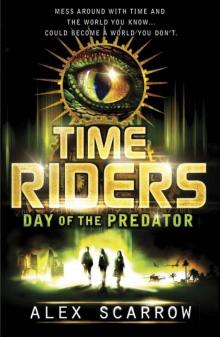 Day of the Predator
Day of the Predator Ellie Quin Book 3: Beneath the Neon Sky
Ellie Quin Book 3: Beneath the Neon Sky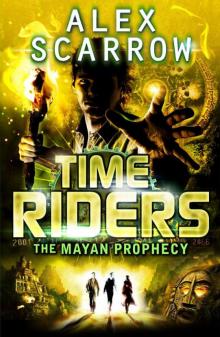 The Mayan Prophecy
The Mayan Prophecy October Skies
October Skies Ellie Quin Episode 4: Ellie Quin in WonderLand (The Ellie Quin Series)
Ellie Quin Episode 4: Ellie Quin in WonderLand (The Ellie Quin Series)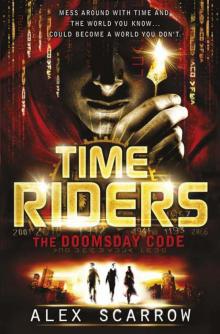 Time Riders
Time Riders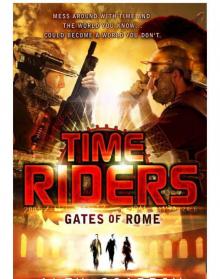 Gates of Rome
Gates of Rome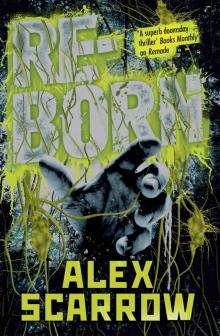 Reborn
Reborn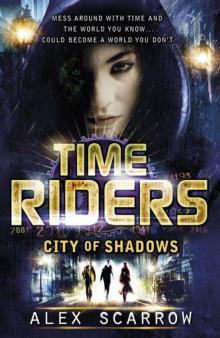 City of Shadows
City of Shadows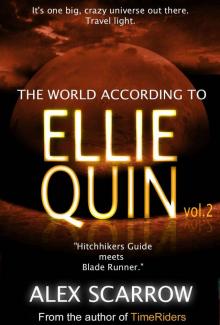 Ellie Quin Book 2: The World According to Ellie Quin (The Ellie Quin Series)
Ellie Quin Book 2: The World According to Ellie Quin (The Ellie Quin Series) Ellie Quin Episode 5: A Girl Reborn
Ellie Quin Episode 5: A Girl Reborn Spore
Spore The Eternal War
The Eternal War Last Light
Last Light Remade
Remade Ellie Quin Book 2: The World According to Ellie Quin
Ellie Quin Book 2: The World According to Ellie Quin Ellie Quin Book 3: Beneath the Neon Sky (The Ellie Quin Series)
Ellie Quin Book 3: Beneath the Neon Sky (The Ellie Quin Series)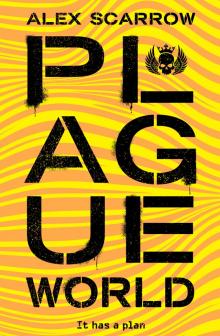 Plague World
Plague World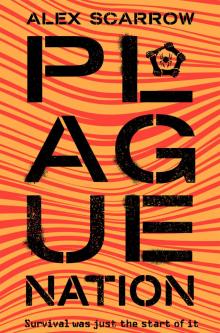 Plague Nation
Plague Nation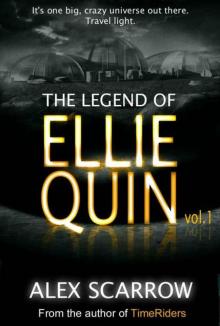 Ellie Quin Book 01: The Legend of Ellie Quin
Ellie Quin Book 01: The Legend of Ellie Quin Ellie Quin - 04 - Ellie Quin in WonderLand
Ellie Quin - 04 - Ellie Quin in WonderLand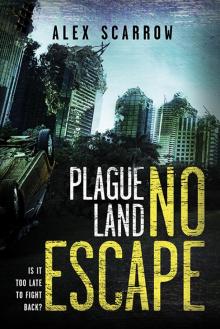 No Escape
No Escape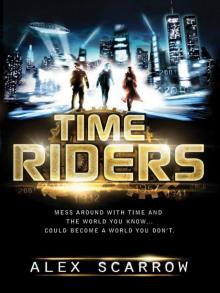 TimeRiders
TimeRiders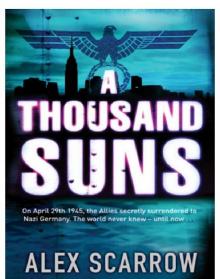 A Thousand Suns
A Thousand Suns The Candle Man
The Candle Man The Pirate Kings
The Pirate Kings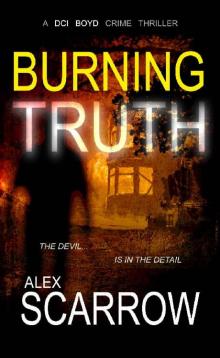 Burning Truth: An Edge-0f-The-Seat British Crime Thriller (DCI BOYD CRIME THRILLERS Book3) (DCI BOYD CRIME SERIES)
Burning Truth: An Edge-0f-The-Seat British Crime Thriller (DCI BOYD CRIME THRILLERS Book3) (DCI BOYD CRIME SERIES)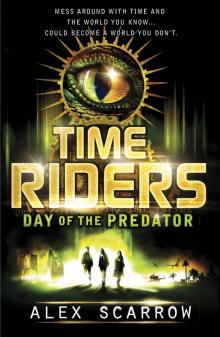 Day of the Predator tr-2
Day of the Predator tr-2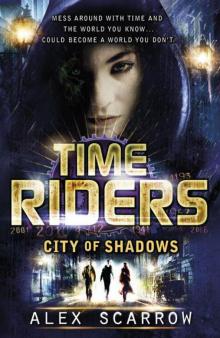 City of Shadows tr-6
City of Shadows tr-6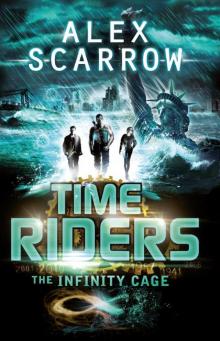 TimeRiders: The Infinity Cage (book 9)
TimeRiders: The Infinity Cage (book 9)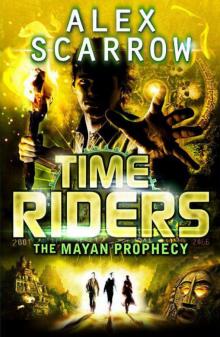 The mayan prophecy (Timeriders # 8)
The mayan prophecy (Timeriders # 8)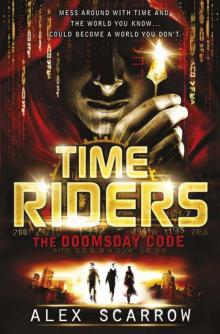 TimeRiders: The Doomsday Code (Book 3)
TimeRiders: The Doomsday Code (Book 3)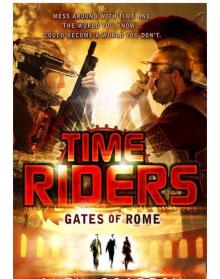 Gates of Rome tr-5
Gates of Rome tr-5 TimeRiders: The Pirate Kings (Book 7)
TimeRiders: The Pirate Kings (Book 7)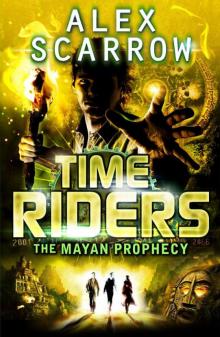 TimeRiders: The Mayan Prophecy (Book 8)
TimeRiders: The Mayan Prophecy (Book 8)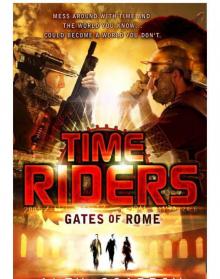 TimeRiders 05 - Gates of Rome
TimeRiders 05 - Gates of Rome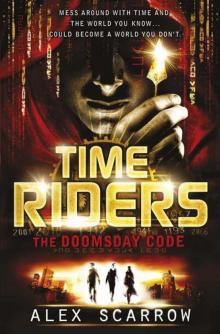 The Doomsday Code tr-3
The Doomsday Code tr-3 The Eternal War tr-4
The Eternal War tr-4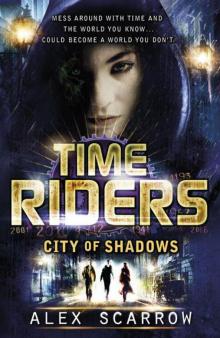 TimeRiders: City of Shadows (Book 6)
TimeRiders: City of Shadows (Book 6)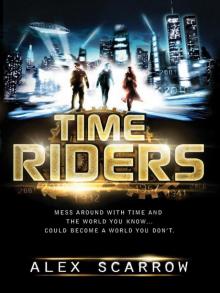 Time Riders tr-1
Time Riders tr-1 Afterlight
Afterlight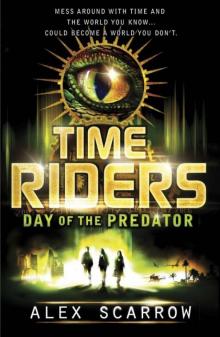 TimeRiders, Day of the Predator
TimeRiders, Day of the Predator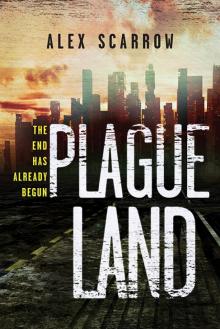 Plague Land Series, Book 1
Plague Land Series, Book 1